外研版(2019)必修第一册Unit 4 Friends Forever Using language Listening 课件(共59张PPT,内镶嵌视频)
文档属性
| 名称 | 外研版(2019)必修第一册Unit 4 Friends Forever Using language Listening 课件(共59张PPT,内镶嵌视频) | 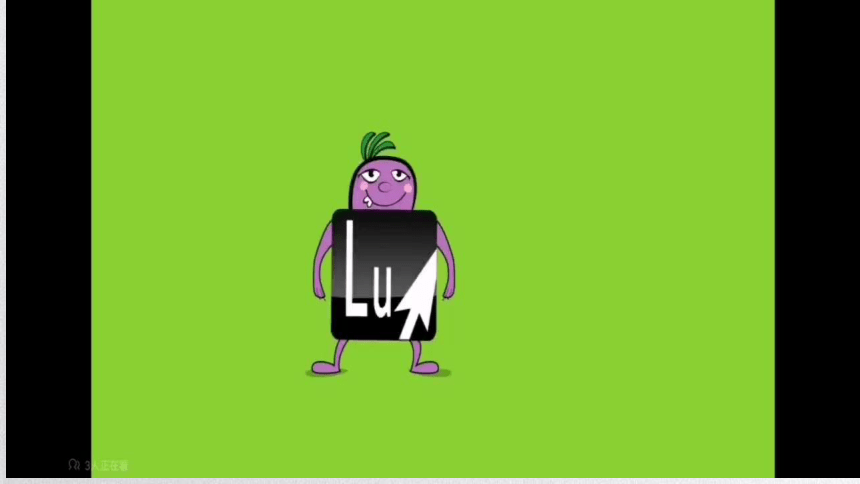 | |
| 格式 | pptx | ||
| 文件大小 | 20.2MB | ||
| 资源类型 | 教案 | ||
| 版本资源 | 外研版(2019) | ||
| 科目 | 英语 | ||
| 更新时间 | 2024-03-07 15:17:46 | ||
图片预览

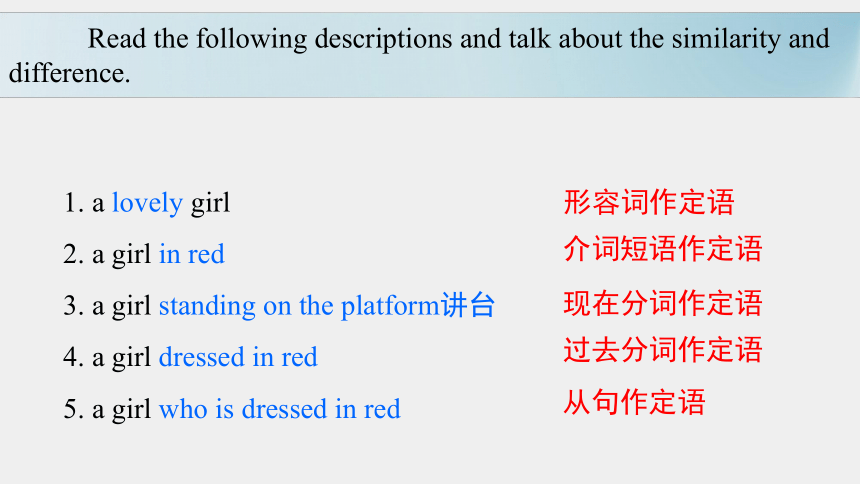

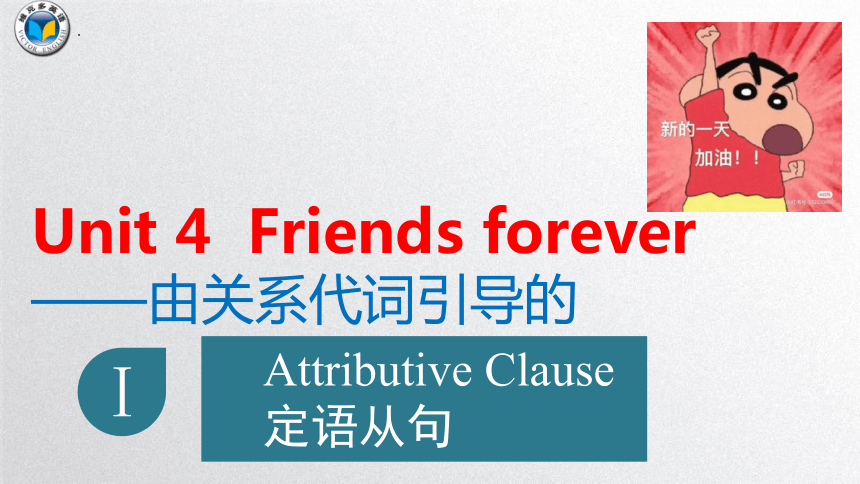
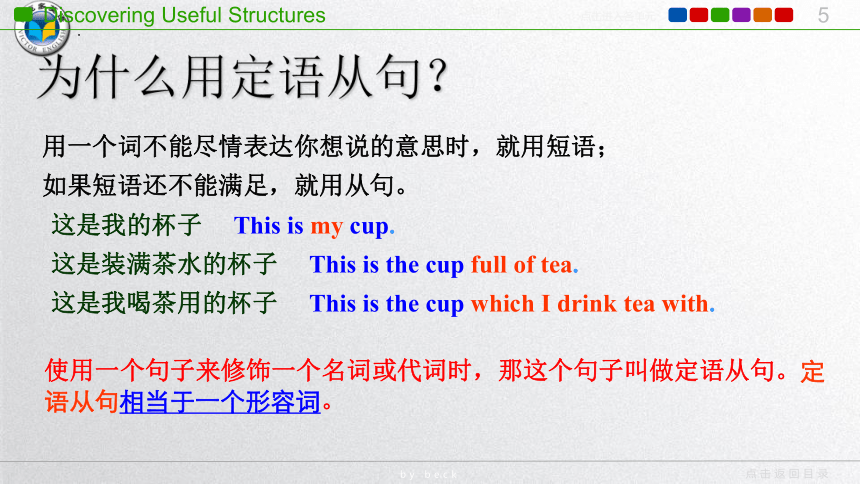
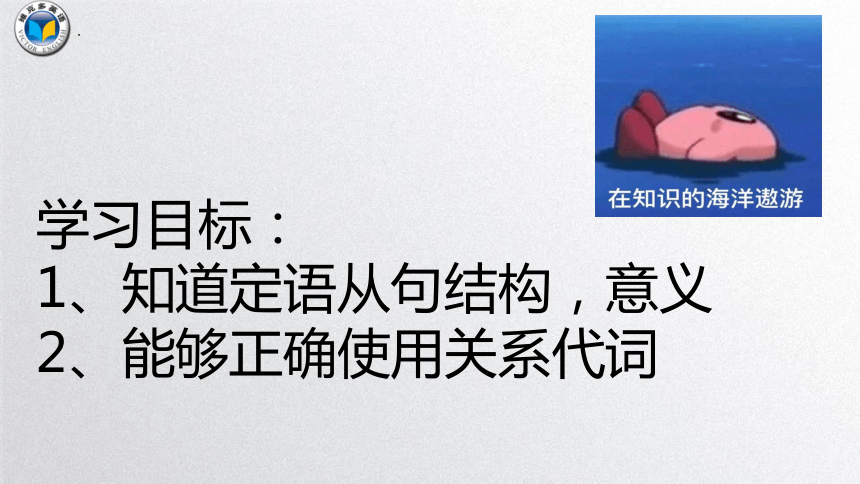
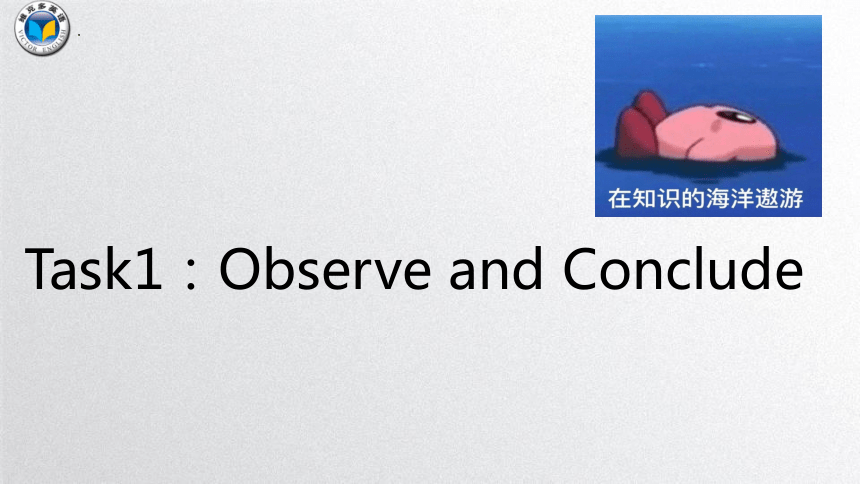
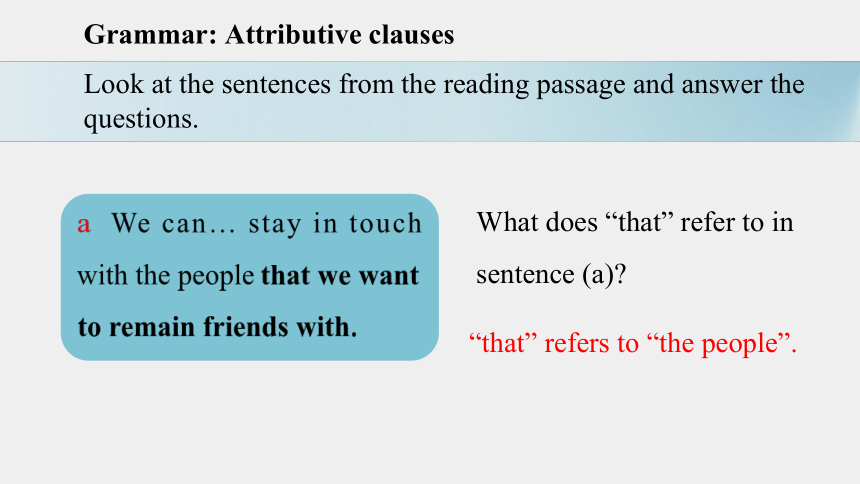

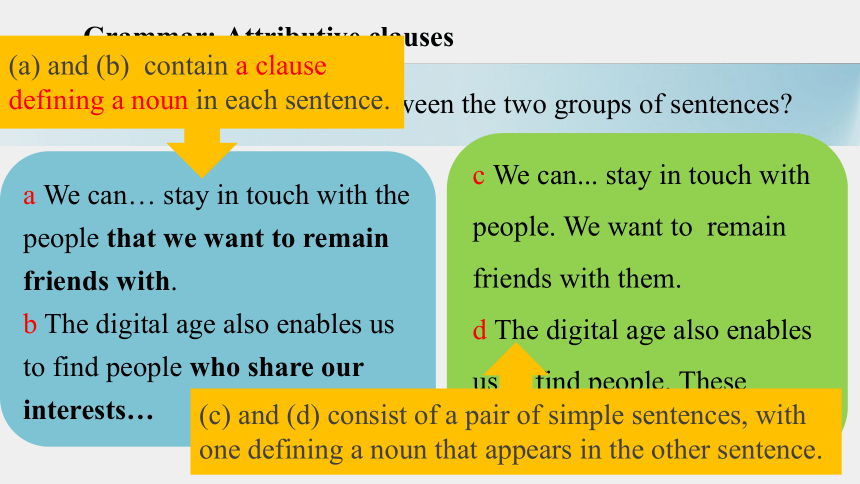
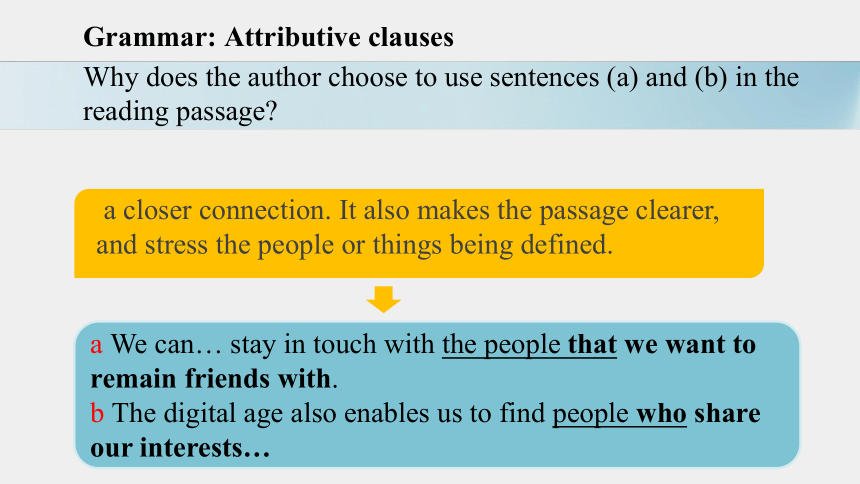
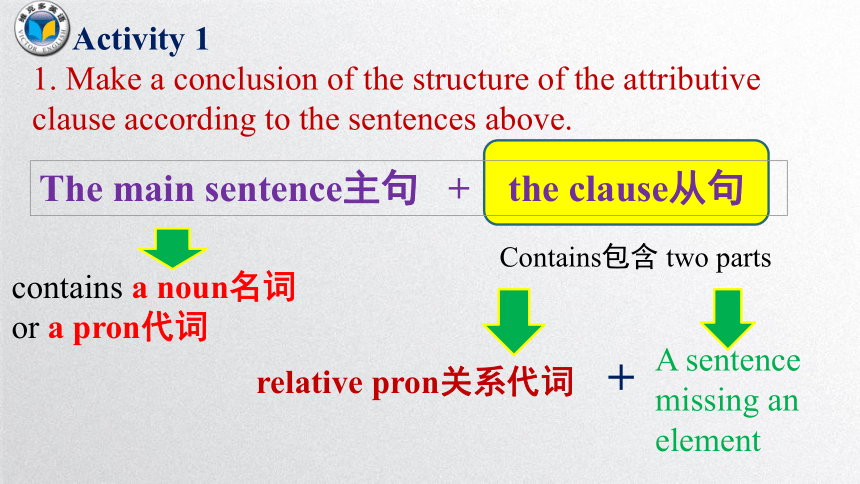
文档简介
(共59张PPT)
Read the following descriptions and talk about the similarity and difference.
1. a lovely girl
2. a girl in red
3. a girl standing on the platform讲台
4. a girl dressed in red
5. a girl who is dressed in red
形容词作定语
从句作定语
介词短语作定语
过去分词作定语
现在分词作定语
1.作用:修饰限定名词或代词
2.意义:“...的”
3.位置:单词放前,短语/句子放后
(短前长后)
定语
Unit 4 Friends forever
——由关系代词引导的
Ⅰ
Attributive Clause
定语从句
为什么用定语从句?
用一个词不能尽情表达你想说的意思时,就用短语;
如果短语还不能满足,就用从句。
这是我的杯子 This is my cup.
这是装满茶水的杯子 This is the cup full of tea.
这是我喝茶用的杯子 This is the cup which I drink tea with.
使用一个句子来修饰一个名词或代词时,那这个句子叫做定语从句。定语从句相当于一个形容词。
学习目标:
1、知道定语从句结构,意义2、能够正确使用关系代词
Task1:Observe and Conclude
Grammar: Attributive clauses
Look at the sentences from the reading passage and answer the questions.
a We can… stay in touch with the people that we want to remain friends with.
What does “that” refer to in sentence (a)
“that” refers to “the people”.
Grammar: Attributive clauses
Look at the sentences from the reading passage and answer the questions.
b The digital age also enables us to find people who share our interests…
What does “who” refer to in sentence (b)
“who” refers to “people”.
Grammar: Attributive clauses
What is the differences between the two groups of sentences
a We can… stay in touch with the people that we want to remain friends with.
b The digital age also enables us to find people who share our interests…
(a) and (b) contain a clause defining a noun in each sentence.
c We can... stay in touch with people. We want to remain friends with them.
d The digital age also enables us to find people. These people share our interests…
(c) and (d) consist of a pair of simple sentences, with one defining a noun that appears in the other sentence.
Grammar: Attributive clauses
Why does the author choose to use sentences (a) and (b) in the reading passage
a We can… stay in touch with the people that we want to remain friends with.
b The digital age also enables us to find people who share
our interests…
a closer connection. It also makes the passage clearer, and stress the people or things being defined.
The main sentence主句 + the clause从句
contains a noun名词 or a pron代词
relative pron关系代词 +
A sentence missing an element
Activity 1
1. Make a conclusion of the structure of the attributive clause according to the sentences above.
Contains包含 two parts
主句 + 从句
包含名词 或代词
关系代词 +
缺失句子成分的句子
Activity 1
1. 定语从句的结构.
2. Discuss their relations.
relative pron
关系代词
1.noun or pron先行词
2.the clause从句
3.the main sentence and the clause
1.That /who refers to the noun or pron.
2.That/who acts as Subject主 or Object宾语 in the clause.That/who introduces引导 the clause.
3.That /who connects the main sentence and the clause.
noun/pron -------the clause
4.The noun/pron is defined限定and modified修饰by the clause从句.
2. 关系代词的功能.
关系代词
指代先行词
引导定语从句,在从句中充当句子成分
连接主句和从句
先行词被定语从句修饰和限定.
that
who
“that” can refer to a person or a thing指人或物 ,as the subject or object 做主语或宾语.
“who” can refer to a person指人, as the subject or object作主语或宾语.
3. The use of who and that.
which
whom
whose
“which” can refer to a thing, as the subject or object .
“whom” can refer to a person ,as the object .
“whose” can refer to a thing or a person to show the relationship of belonging表所属关系,as the attribute of noun作定语.
4.What other relative prons are used to introduce attributive clauses What do they refer to
Task2:Compare and Feel
一、which/that指物(从句缺主宾成分)
1. The bag is mine. 2. The bag is on the desk.
The bag _____________is on the desk is mine.
2. The pen is red. 2. The pen belongs to me.
The pen ______________is red belongs to me.
3. The book is intersting. 2. I bought the book yeterday.
The book ______________I bought yesterday is intersting.
that/which
that/which
that/which
1.找共同的名词
2.找定语(....的)
3.把定语放到名词后
4.用关系代词替换定语从句中的名词(关系代词放到定语从句句首)
Translation
1. 他看了我借的书。
He read the book that/which I borrowed.
2. 我看过的这部电影很有趣。
The film that/which I watched is intersting.
二、who/that 指人(从句缺主宾成分)
1. The boy is standing there. 2. The boy is my brother.
The boy______________is standing there is my brother.
2. The boy is Harry Potter. 2. The boy wears glasses.
The boy______________wears glasses is Harry Potter.
who/that
who/that
Translation
1. 我昨天看见的女孩是他的妹妹。
The girl who/that I saw yesterday is his sister.
2. 正在游泳的那个女孩是我的姐姐。
The girl who/that is swimming is my sister.
3、只用that的考点
1)当先行词被序数词或形容词最高级修饰时。
eg. Tom is the cleverest boy that I have ever known.
2)先行词既有人又有物时,用that, 既不用which,也不用who。
eg. He told us many interesting things and persons that we had never heard.
3、只用that的情况
3)当先行词是这些不定代词或被他们修饰时时,如:all,anything,something,nothing,none,the one,everything,little,few,much,any ,some,no。
eg. Here is something that I will tell you.
eg. I've written down all the things that the teacher doesn't allow us to do.
3、只用that的情况
4)先行词被the only,the very,the last修饰时。
eg. This is the only novel that you want to borrow.
4、只用which的考点
1)介词后。
eg.This is the room in which he lives.
2)非限制性定语从句用which。
eg.The necklace, which you gave me as a
present, was lost yesterday.
1. The boy is standing there. 2. The boy is my brother.
The boy ____________ is standing there is my brother.
三、who和whom指人(从句缺宾语)
2. The man is my cousin. 2. You met the man yesterday.
The man _______________ you met yesterday is my cousin.
who/that
who/whom/that
Translation
和我一起住live with的这个女孩17岁。
The girl who/whom/that I live with is 17.
和我招手wave at的这个女孩17岁。
The girl who/that waves at me is 17.
1. The boy is my classmate. 2. The boy’s mother is a teacher.
The boy ____________ mother is a teacher is my classmate.
四、whose指人或物(从句缺定语,表所属关系)
1. The man is my student. 2. The man’s work was awarded .
The man _______________ work was awarded is my student.
whose
whose
蝴蝶关代图
人
物
which(主、宾)
who(主、宾)
that
(主、宾)
whose(定)
whom(宾)
1.关系代词作宾语时可以省略(限制性定语从句)
2.介词后不能用that和who,介词后的关系代词不能省略
在下列句子横线处填入适当关系代词
①Do you know the girl ________________ is dancing on the stage
②This is the museum ________________ was built last year.
③The man ________________ you saw just now is our manager.
④The man with ______________ you shook hands just now is our headmaster.
⑤This is the camera with ______________ he often takes photos.
⑥This is the library from ______________ you can borrow books.
⑦The man ______________ son is a doctor is our professor.
练习
who/that
which/that
whom/who
whom
which
which
whose
Task3:Consolidation
I. Use the proper relative pronouns fill in the blanks.
1.A nurse __________ understands the healing value of silence can use this understanding to assist in the care of patients from their own and from other cultures. (2016全国卷I)
2. But Sarah, _______ has taken part in shows along with top models, wants to prove that she has brains as well as beauty. (2017全国卷III)
3.Two of the authors of the review also made a study published in 2014 ____________ showed a mere five to 10 minutes a day of running reduced the risk of heart disease and early deaths from all causes. (2018全国卷I)
who/that
who
that/which
4. Kate, ________ sister I shares a room with when we were at college, has gone to work in Australia. (2018天津)
5. The books on the desk, _________ covers are shiny, are prizes for us.(2015四川)
6. This is the best book _______ I’ve ever read.
7. Jack will come to Beijing, ______ made me excited.
8. Peter broke the school rules, ________ annoyed his parents.
whose
whose
that
which
which
which用于指代前文的整个句子
2.Now look for more sentences with attributive clauses in the reading passage.
1. What if the only way of getting news from faraway friends was writing letters that took ages to be delivered
That refers to letters (things) used as Subject in the clause.
2. All you need is a wi-fi connection.
All that you need
That refers to all (things) used as Object.
3. Whatever our hobbies, the Internet can connect us with others who also enjoy doing them, even if they live on the other side of the world.
Who refers to others (persons) used as Subject.
4. On social media sites, people tend to post only positive updates that make them appear happy and friendly.
That refers to updates (things) used as Subject.
3.Rewrite重写 the underlined sentences划线的句子 with that, which, who, whom or whose.
Lucy is my friend. She has a hearing problem. When she first came to my school, she seemed lonely, but we soon became friends. At first it was difficult to communicate with her. So I learnt a new language. It allows me to “speak” with my hands.
So I learnt a new language which / that allows me to “speak” with my hands.
Lucy is my friend who / that has a hearing problem.
Rewrite the underlined sentences with that, which, who, whom or whose.
Lucy is a smart girl. Her ideas are always inspiring. I sometimes have problems. I can’t solve them. When this happens, I always ask Lucy for help. Lucy is a good listener. I enjoy sharing moments of my life with her.
Lucy is a smart girl whose ideas are always inspiring.
I sometimes have problems (that / which) I can’t solve.
Rewrite the underlined sentences with that, which, who, whom or whose.
作宾语可省略
Lucy is a smart girl. Her ideas are always inspiring. I sometimes have problems. I can’t solve them. When this happens, I always ask Lucy for help. Lucy is a good listener. I enjoy sharing moments of my life with her.
Lucy is a good listener (whom / who / that) I enjoy sharing moments of my life with.
Rewrite the underlined sentences with that, which, who, whom or whose.
4.Complete the online forum post网络论坛公告 with that, which, who, whom or whose.
Walking group welcomes new members!
Walk and Talk is a group 1. __________ meets every Sunday. It is free to join. Walk and Talk is perfect for anyone 2. ______ weekends need some excitement. We are all teenagers 3. ________ love walking and making new friends.
that / which
whose
who / that
Complete the online forum post with that, which, who, whom or whose.
We want you to join us! The next walk 4. ____________ is open to new members is on 22 July. You can also bring your friends. However, anyone 5. _____________ you bring must be over 12 years old.
Come along and join the fun!
which / that
whom / who
Complete the online forum post with that, which, who, whom or whose.
A主句 B定语从句
1. Judy likes the pink scarf. It was made by her aunt.
2. The old man is my math teacher. My father is speaking to him.
3. Sue lent me some books. She has read them many times.
4. Do you usually visit your grandparents They live in the countryside.
5. The photos look very nice. My brother took the photos.
Homework将左右两边的句子合成带有定语从句的主从复合句
What do they refer to and what are their sentence elements
words A person (指人) A thing (指物) Subject(主语) Object(宾语) Attribute(定语)
that
which
who
whom
whose
√
√
√
√
√
√
√
√
√
√
√
√
√
√
√
Ⅱ
Vocabulary building
Like any good soup,
this won’t fail to make you smile when you’re feeling down.
AII you need to get started is a box of love.
Pour it into a pot and mix it with five grams of smiles.
Next, add:
two cups of trust,
one spoon of encouragement,
three spoons of helpfulness,
three cups of good conversation,
one pack of similar interests,
one glass of comfort,
two drops of patience,
one bag of passion,
one piece of generosity,
… and a slice of humour!
4. Read the recipe, underline all the measure words(量词), and pay attention to the meaning of the words in bold.
Friendship soup
Friendship soup
Like any good soup,
this won’t fail to make you smile when you’re feeling down.
AII you need to get started is a box of love.
Pour it into a pot and mix it with five grams of smiles.
Next, add:
two cups of trust,
one spoon of encouragement,
three spoons of helpfulness,
three cups of good conversation,
one pack of similar interests,
one glass of comfort,
two drops of patience,
one bag of passion,
one piece of generosity,
… and a slice of humour!
1盒
5克
2杯
1勺
3勺
3杯
1包
1杯
2滴
1袋
1块
1片
measure words(量词)
generous-generosity
curious-curiosity
5.Match the words in bold in the recipe to the dictionary entries.
generosity
trust
passion
helpfulness
comfort
humour
encouragement
patience
passion-passionate(adj.)
enthusiasm-enthusiastic (adj.)
III
Listening
Andy, Clara and Matt are good friends. They are planning to go on a trip when…
what a shame!真遗憾
for ages很久
take quite a while to get well 花很长时间恢复健康
give up holiday 放弃度假
need comfort and support需要安慰和支持
cheer him up使他振作起来
feel even worse感到更糟
send him funny postcards寄送有趣的明信片
have a video chat with him和他视频聊天
Before-Listening:words and expressions.
not allowed to take videos不允许拍视频
print a photo打印一张照片
a life-sized cardboard cutout一个真人大小的纸板人
as if好像,似乎
laugh at 大笑
Before-Listening:words and expressions.
While-listening
Listen to the conversation and number the events in the correct order.
Andy and Clara thought about postponing their trip.
Matt broke his leg.
Andy and Clara agreed on a plan.
Matt called Clara.
Andy, Clara and Matt decided to go to London.
Andy and Clara made a cardboard version of Matt.
postpone/ delay/ put off doing 推迟
agree with sb同意某人
While-listening
Listen to the conversation and number the events in the correct order.
Andy and Clara thought about postponing their trip.
Matt broke his leg.
Andy and Clara agreed on a plan.
Matt called Clara.
Andy, Clara and Matt decided to go to London.
Andy and Clara made a cardboard version of Matt.
4
2
5
3
1
6
postpone/ delay/ put off doing 推迟
agree with sb同意某人
Listen and complete the table.
photos
feel even worse
funny postcards
take days
video chat
allowed
life-sized
laugh
While-listening
Why not do sth 为什么不......
Why don’t we… 为什么不.....
How /what about doing sth?.....怎么样
I was wondering whether…我在想是否可以........
post-Listening:giving suggestions.
post-Listening:giving suggestions.
It is a good idea to do sth做某事是一个好主意
......may be a wise choice. ....可能是一个明智的选择
It is beneficial for you to do sth 做某事对你是有益的
It would be helpful if... 如果....将是有帮助的
You might/may as well do sth 你最好做某事
You may consider doing sth 你可以考虑做某事
It is suggested that you should do sth 建议你做某事
It is highly recommended that you should do sth非常建议你做某事
Read the following descriptions and talk about the similarity and difference.
1. a lovely girl
2. a girl in red
3. a girl standing on the platform讲台
4. a girl dressed in red
5. a girl who is dressed in red
形容词作定语
从句作定语
介词短语作定语
过去分词作定语
现在分词作定语
1.作用:修饰限定名词或代词
2.意义:“...的”
3.位置:单词放前,短语/句子放后
(短前长后)
定语
Unit 4 Friends forever
——由关系代词引导的
Ⅰ
Attributive Clause
定语从句
为什么用定语从句?
用一个词不能尽情表达你想说的意思时,就用短语;
如果短语还不能满足,就用从句。
这是我的杯子 This is my cup.
这是装满茶水的杯子 This is the cup full of tea.
这是我喝茶用的杯子 This is the cup which I drink tea with.
使用一个句子来修饰一个名词或代词时,那这个句子叫做定语从句。定语从句相当于一个形容词。
学习目标:
1、知道定语从句结构,意义2、能够正确使用关系代词
Task1:Observe and Conclude
Grammar: Attributive clauses
Look at the sentences from the reading passage and answer the questions.
a We can… stay in touch with the people that we want to remain friends with.
What does “that” refer to in sentence (a)
“that” refers to “the people”.
Grammar: Attributive clauses
Look at the sentences from the reading passage and answer the questions.
b The digital age also enables us to find people who share our interests…
What does “who” refer to in sentence (b)
“who” refers to “people”.
Grammar: Attributive clauses
What is the differences between the two groups of sentences
a We can… stay in touch with the people that we want to remain friends with.
b The digital age also enables us to find people who share our interests…
(a) and (b) contain a clause defining a noun in each sentence.
c We can... stay in touch with people. We want to remain friends with them.
d The digital age also enables us to find people. These people share our interests…
(c) and (d) consist of a pair of simple sentences, with one defining a noun that appears in the other sentence.
Grammar: Attributive clauses
Why does the author choose to use sentences (a) and (b) in the reading passage
a We can… stay in touch with the people that we want to remain friends with.
b The digital age also enables us to find people who share
our interests…
a closer connection. It also makes the passage clearer, and stress the people or things being defined.
The main sentence主句 + the clause从句
contains a noun名词 or a pron代词
relative pron关系代词 +
A sentence missing an element
Activity 1
1. Make a conclusion of the structure of the attributive clause according to the sentences above.
Contains包含 two parts
主句 + 从句
包含名词 或代词
关系代词 +
缺失句子成分的句子
Activity 1
1. 定语从句的结构.
2. Discuss their relations.
relative pron
关系代词
1.noun or pron先行词
2.the clause从句
3.the main sentence and the clause
1.That /who refers to the noun or pron.
2.That/who acts as Subject主 or Object宾语 in the clause.That/who introduces引导 the clause.
3.That /who connects the main sentence and the clause.
noun/pron -------the clause
4.The noun/pron is defined限定and modified修饰by the clause从句.
2. 关系代词的功能.
关系代词
指代先行词
引导定语从句,在从句中充当句子成分
连接主句和从句
先行词被定语从句修饰和限定.
that
who
“that” can refer to a person or a thing指人或物 ,as the subject or object 做主语或宾语.
“who” can refer to a person指人, as the subject or object作主语或宾语.
3. The use of who and that.
which
whom
whose
“which” can refer to a thing, as the subject or object .
“whom” can refer to a person ,as the object .
“whose” can refer to a thing or a person to show the relationship of belonging表所属关系,as the attribute of noun作定语.
4.What other relative prons are used to introduce attributive clauses What do they refer to
Task2:Compare and Feel
一、which/that指物(从句缺主宾成分)
1. The bag is mine. 2. The bag is on the desk.
The bag _____________is on the desk is mine.
2. The pen is red. 2. The pen belongs to me.
The pen ______________is red belongs to me.
3. The book is intersting. 2. I bought the book yeterday.
The book ______________I bought yesterday is intersting.
that/which
that/which
that/which
1.找共同的名词
2.找定语(....的)
3.把定语放到名词后
4.用关系代词替换定语从句中的名词(关系代词放到定语从句句首)
Translation
1. 他看了我借的书。
He read the book that/which I borrowed.
2. 我看过的这部电影很有趣。
The film that/which I watched is intersting.
二、who/that 指人(从句缺主宾成分)
1. The boy is standing there. 2. The boy is my brother.
The boy______________is standing there is my brother.
2. The boy is Harry Potter. 2. The boy wears glasses.
The boy______________wears glasses is Harry Potter.
who/that
who/that
Translation
1. 我昨天看见的女孩是他的妹妹。
The girl who/that I saw yesterday is his sister.
2. 正在游泳的那个女孩是我的姐姐。
The girl who/that is swimming is my sister.
3、只用that的考点
1)当先行词被序数词或形容词最高级修饰时。
eg. Tom is the cleverest boy that I have ever known.
2)先行词既有人又有物时,用that, 既不用which,也不用who。
eg. He told us many interesting things and persons that we had never heard.
3、只用that的情况
3)当先行词是这些不定代词或被他们修饰时时,如:all,anything,something,nothing,none,the one,everything,little,few,much,any ,some,no。
eg. Here is something that I will tell you.
eg. I've written down all the things that the teacher doesn't allow us to do.
3、只用that的情况
4)先行词被the only,the very,the last修饰时。
eg. This is the only novel that you want to borrow.
4、只用which的考点
1)介词后。
eg.This is the room in which he lives.
2)非限制性定语从句用which。
eg.The necklace, which you gave me as a
present, was lost yesterday.
1. The boy is standing there. 2. The boy is my brother.
The boy ____________ is standing there is my brother.
三、who和whom指人(从句缺宾语)
2. The man is my cousin. 2. You met the man yesterday.
The man _______________ you met yesterday is my cousin.
who/that
who/whom/that
Translation
和我一起住live with的这个女孩17岁。
The girl who/whom/that I live with is 17.
和我招手wave at的这个女孩17岁。
The girl who/that waves at me is 17.
1. The boy is my classmate. 2. The boy’s mother is a teacher.
The boy ____________ mother is a teacher is my classmate.
四、whose指人或物(从句缺定语,表所属关系)
1. The man is my student. 2. The man’s work was awarded .
The man _______________ work was awarded is my student.
whose
whose
蝴蝶关代图
人
物
which(主、宾)
who(主、宾)
that
(主、宾)
whose(定)
whom(宾)
1.关系代词作宾语时可以省略(限制性定语从句)
2.介词后不能用that和who,介词后的关系代词不能省略
在下列句子横线处填入适当关系代词
①Do you know the girl ________________ is dancing on the stage
②This is the museum ________________ was built last year.
③The man ________________ you saw just now is our manager.
④The man with ______________ you shook hands just now is our headmaster.
⑤This is the camera with ______________ he often takes photos.
⑥This is the library from ______________ you can borrow books.
⑦The man ______________ son is a doctor is our professor.
练习
who/that
which/that
whom/who
whom
which
which
whose
Task3:Consolidation
I. Use the proper relative pronouns fill in the blanks.
1.A nurse __________ understands the healing value of silence can use this understanding to assist in the care of patients from their own and from other cultures. (2016全国卷I)
2. But Sarah, _______ has taken part in shows along with top models, wants to prove that she has brains as well as beauty. (2017全国卷III)
3.Two of the authors of the review also made a study published in 2014 ____________ showed a mere five to 10 minutes a day of running reduced the risk of heart disease and early deaths from all causes. (2018全国卷I)
who/that
who
that/which
4. Kate, ________ sister I shares a room with when we were at college, has gone to work in Australia. (2018天津)
5. The books on the desk, _________ covers are shiny, are prizes for us.(2015四川)
6. This is the best book _______ I’ve ever read.
7. Jack will come to Beijing, ______ made me excited.
8. Peter broke the school rules, ________ annoyed his parents.
whose
whose
that
which
which
which用于指代前文的整个句子
2.Now look for more sentences with attributive clauses in the reading passage.
1. What if the only way of getting news from faraway friends was writing letters that took ages to be delivered
That refers to letters (things) used as Subject in the clause.
2. All you need is a wi-fi connection.
All that you need
That refers to all (things) used as Object.
3. Whatever our hobbies, the Internet can connect us with others who also enjoy doing them, even if they live on the other side of the world.
Who refers to others (persons) used as Subject.
4. On social media sites, people tend to post only positive updates that make them appear happy and friendly.
That refers to updates (things) used as Subject.
3.Rewrite重写 the underlined sentences划线的句子 with that, which, who, whom or whose.
Lucy is my friend. She has a hearing problem. When she first came to my school, she seemed lonely, but we soon became friends. At first it was difficult to communicate with her. So I learnt a new language. It allows me to “speak” with my hands.
So I learnt a new language which / that allows me to “speak” with my hands.
Lucy is my friend who / that has a hearing problem.
Rewrite the underlined sentences with that, which, who, whom or whose.
Lucy is a smart girl. Her ideas are always inspiring. I sometimes have problems. I can’t solve them. When this happens, I always ask Lucy for help. Lucy is a good listener. I enjoy sharing moments of my life with her.
Lucy is a smart girl whose ideas are always inspiring.
I sometimes have problems (that / which) I can’t solve.
Rewrite the underlined sentences with that, which, who, whom or whose.
作宾语可省略
Lucy is a smart girl. Her ideas are always inspiring. I sometimes have problems. I can’t solve them. When this happens, I always ask Lucy for help. Lucy is a good listener. I enjoy sharing moments of my life with her.
Lucy is a good listener (whom / who / that) I enjoy sharing moments of my life with.
Rewrite the underlined sentences with that, which, who, whom or whose.
4.Complete the online forum post网络论坛公告 with that, which, who, whom or whose.
Walking group welcomes new members!
Walk and Talk is a group 1. __________ meets every Sunday. It is free to join. Walk and Talk is perfect for anyone 2. ______ weekends need some excitement. We are all teenagers 3. ________ love walking and making new friends.
that / which
whose
who / that
Complete the online forum post with that, which, who, whom or whose.
We want you to join us! The next walk 4. ____________ is open to new members is on 22 July. You can also bring your friends. However, anyone 5. _____________ you bring must be over 12 years old.
Come along and join the fun!
which / that
whom / who
Complete the online forum post with that, which, who, whom or whose.
A主句 B定语从句
1. Judy likes the pink scarf. It was made by her aunt.
2. The old man is my math teacher. My father is speaking to him.
3. Sue lent me some books. She has read them many times.
4. Do you usually visit your grandparents They live in the countryside.
5. The photos look very nice. My brother took the photos.
Homework将左右两边的句子合成带有定语从句的主从复合句
What do they refer to and what are their sentence elements
words A person (指人) A thing (指物) Subject(主语) Object(宾语) Attribute(定语)
that
which
who
whom
whose
√
√
√
√
√
√
√
√
√
√
√
√
√
√
√
Ⅱ
Vocabulary building
Like any good soup,
this won’t fail to make you smile when you’re feeling down.
AII you need to get started is a box of love.
Pour it into a pot and mix it with five grams of smiles.
Next, add:
two cups of trust,
one spoon of encouragement,
three spoons of helpfulness,
three cups of good conversation,
one pack of similar interests,
one glass of comfort,
two drops of patience,
one bag of passion,
one piece of generosity,
… and a slice of humour!
4. Read the recipe, underline all the measure words(量词), and pay attention to the meaning of the words in bold.
Friendship soup
Friendship soup
Like any good soup,
this won’t fail to make you smile when you’re feeling down.
AII you need to get started is a box of love.
Pour it into a pot and mix it with five grams of smiles.
Next, add:
two cups of trust,
one spoon of encouragement,
three spoons of helpfulness,
three cups of good conversation,
one pack of similar interests,
one glass of comfort,
two drops of patience,
one bag of passion,
one piece of generosity,
… and a slice of humour!
1盒
5克
2杯
1勺
3勺
3杯
1包
1杯
2滴
1袋
1块
1片
measure words(量词)
generous-generosity
curious-curiosity
5.Match the words in bold in the recipe to the dictionary entries.
generosity
trust
passion
helpfulness
comfort
humour
encouragement
patience
passion-passionate(adj.)
enthusiasm-enthusiastic (adj.)
III
Listening
Andy, Clara and Matt are good friends. They are planning to go on a trip when…
what a shame!真遗憾
for ages很久
take quite a while to get well 花很长时间恢复健康
give up holiday 放弃度假
need comfort and support需要安慰和支持
cheer him up使他振作起来
feel even worse感到更糟
send him funny postcards寄送有趣的明信片
have a video chat with him和他视频聊天
Before-Listening:words and expressions.
not allowed to take videos不允许拍视频
print a photo打印一张照片
a life-sized cardboard cutout一个真人大小的纸板人
as if好像,似乎
laugh at 大笑
Before-Listening:words and expressions.
While-listening
Listen to the conversation and number the events in the correct order.
Andy and Clara thought about postponing their trip.
Matt broke his leg.
Andy and Clara agreed on a plan.
Matt called Clara.
Andy, Clara and Matt decided to go to London.
Andy and Clara made a cardboard version of Matt.
postpone/ delay/ put off doing 推迟
agree with sb同意某人
While-listening
Listen to the conversation and number the events in the correct order.
Andy and Clara thought about postponing their trip.
Matt broke his leg.
Andy and Clara agreed on a plan.
Matt called Clara.
Andy, Clara and Matt decided to go to London.
Andy and Clara made a cardboard version of Matt.
4
2
5
3
1
6
postpone/ delay/ put off doing 推迟
agree with sb同意某人
Listen and complete the table.
photos
feel even worse
funny postcards
take days
video chat
allowed
life-sized
laugh
While-listening
Why not do sth 为什么不......
Why don’t we… 为什么不.....
How /what about doing sth?.....怎么样
I was wondering whether…我在想是否可以........
post-Listening:giving suggestions.
post-Listening:giving suggestions.
It is a good idea to do sth做某事是一个好主意
......may be a wise choice. ....可能是一个明智的选择
It is beneficial for you to do sth 做某事对你是有益的
It would be helpful if... 如果....将是有帮助的
You might/may as well do sth 你最好做某事
You may consider doing sth 你可以考虑做某事
It is suggested that you should do sth 建议你做某事
It is highly recommended that you should do sth非常建议你做某事
